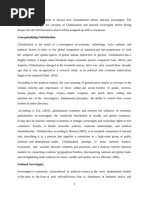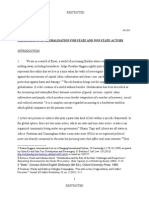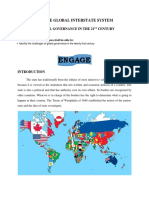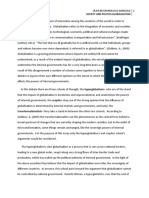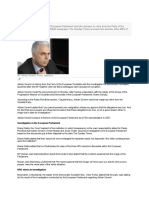0 ratings0% found this document useful (0 votes)
Global politics
Global politics
Uploaded by
saziyakhan927Political dimension of globalisation
Copyright:
© All Rights Reserved
Available Formats
Download as DOCX, PDF, TXT or read online from Scribd
Download as docx, pdf, or txt
Global politics
Global politics
Uploaded by
saziyakhan9270 ratings0% found this document useful (0 votes)
Political dimension of globalisation
Copyright
© © All Rights Reserved
Available Formats
DOCX, PDF, TXT or read online from Scribd
Share this document
Did you find this document useful?
Is this content inappropriate?
Political dimension of globalisation
Copyright:
© All Rights Reserved
Available Formats
Download as DOCX, PDF, TXT or read online from Scribd
Download as docx, pdf, or txt
0 ratings0% found this document useful (0 votes)
Global politics
Global politics
Uploaded by
saziyakhan927Political dimension of globalisation
Copyright:
© All Rights Reserved
Available Formats
Download as DOCX, PDF, TXT or read online from Scribd
Download as docx, pdf, or txt
You are on page 1/ 7
Global Politics
Topic - Political Dimension of Globalization.
Is state sovereignty now an
outdated concept ?
Introduction
State sovereignty which is also recognised as external
sovereignty is the concept that a state is in complete control of
the people and property within their territory as they are an
independent and autonomous entity on the world stage. State
sovereignty also involves the idea that all states are equal,
which means that despite different population sizes and
financial abilities ,they are equal on an international level.
((Globalization has widely been seen to be certain state
sovereignty, creating a post sovereignty government)).In
particular, economic sovereignty has been compromised by
transborder trading, capital and other flows. Some believe that
such development has transformed the nature of the state
giving rights to ,(( competition state, the market state and the
post modern state)).
State and Globalization
The rise of globalization has stimulated a major debate about
the power and significance of states in a globalized world.
Three contrasting positions can be identified :
1. Some theorists have proclaimed the emergence of ((post
sovereignty government )) ,suggesting the rise of
globalization is inevitably marked by the decline of the
state as a meaningful actor.
2. Realists on the other hand tend to deny that globalization
has altered the core feature of world politics, as in earlier
eras, sovereignty states are the primary determinant of
what goes on within their borders and remain the principal
actors in the world stage.
3. Between these two views, however, is a third position
which acknowledges that globalization has brought about
qualitative changes in the role and significance of the
state, and in the nature of sovereignty, but emphasizes
that these have transformed the state rather than
simplified, reduced and increased its power …
One of the central features of economic globalization is the rise
of ((supraterritoriality reflected in declining importance of
territorial location, geographical distance and state borders))
and increasing range of economic activity taking place within a
borderless world. Globalization furthermore is closely
associated with the trend towards regionalization. Reflected in
a growing prominence of regional trading blocs such as the Eu
and North American free trade union .
Political dimensions of globalisation
Globalization has led to a decline in the power of national
governments to direct and influence their economies (especially
with regard to macroeconomic management); and to determine
their political structures. The most dominant of the global
organizations that had emerged was the League of Nations and
now succeeded by the United Nations. At the regional levels,
the African Union, European Union, Organization of American
States, the Arab League, etc exist. The impact of these
organizations is to create a process of institution-building,
where the organizations are able to determine and dictate what
happens in the governance of member states. This is the trend
of political globalization.
With the establishment of the United Nations and related IGOs
(including the International Monetary Fund, World Bank Group,
International Labour Organization, and World Health
Organization), a global governance framework emerged. It has
fostered the creation of thousands of intergovernmental and
nongovernmental organizations that generate a network of
international association . The European Union (EU) that
liberalizes trade and creates common policies among nations
within negotiated geographical boundaries. The EU has
progressed furthest toward the creation of a regional market
and government, as it has allowed the free movement of people
across borders, eliminated barriers to trade, created a
supranational court, and established supranational policies.
According to David Held, one of the chief proponents of this
view, the cosmopolitan democracy of the future would contain
the following political features:
1. A global parliament connected to regions, states, and
localities;
2. A new charter of rights and duties locked into different
domains of political, social, and economic power;
3. The formal separation of political and economic interests;
4. An interconnected global legal system with mechanisms of
enforcement from the local to the global.A number of less
optimistic commentators have challenged the idea that political
globalization is moving in the direction of cosmopolitan
democracy.
State sovereignty now an outdated concept ?
State sovereignty can be recognised as an outdated concept
for a variety of reasons including globalisation, rise of non-state
actors and permeable borders but there are also some views
which reject that state sovereignty is now an outdated concept .
The most prominent proponents of the view states in the era of
globalization (( Kenichi Ohmae)) have been rendered
irrelevant in his two books ((The Borderless World and The End
of the Nation States)). He has argued that economic integration
of the world and its technological spread in the form of webs of
information and communication technologies are making the
boundaries between countries and continents blurred although
on the political maps such boundaries exist.
Non-state actors are able to exercise power and provide a
method of cooperation between countries. Most non-state
actors aim to influence outside borders on an international level
rather than being restricted within the borders of the state itself.
Non governmental organisations such as Amnesty International
which is a pressure group, more than 7 million members
worldwide who aim to combat injustices which are faced all
over the world.
The actions of MultiNational Corporations (MNC’s) by using
pressure. For example, the Citizens’ Clearing-house for
Hazardous Waste (CCHW) , which is a non-state actor, led a
three year public awareness campaign focused on McDonald’s
using the material Styrofoam which is hazardous and toxic to
the environment to ban its use. By 1990, McDonald’s stopped
its use of Styrofoam packaging as over 46 counties and cities
chose to ban it.
However, Realists would argue that states are able to act as
in their self interest as rational autonomous entities with aims
of pursuing security, sovereignty and survival. States are able
to act in their self interest in taking action on what will benefit
them. For example, the USA and Saudi Arabia are ideologically
opposed but the USA have to work with them because they are
dependent on them for oil.
According to Edkins and Zehfuss , globalization has
challenged the idea of self contained territorial states with
suggestions that flow of information, goods and energy around
the world now transcend state boundaries. This has therefore
led to the belief that globalization can be understood in terms of
deterritorialization which means that territory is no longer fixed
and phases of interaction can no longer be contained within the
borders of the states.
Hyper-globalists would argue that globalisation has meant
that the traditional definition of the state is no longer important
as they once were. Globalisation has meant that it has become
increasingly easy for knowledge and information to pass
through borders via the internet. This ultimately means that
states do not have ultimate sovereignty as they are not able to
prevent unwanted information coming into the borders as well
as information being leaked out of their borders.
Due to globalisation ,many states are losing sovereignty in
order to maintain relationships with other states. China is a
state which has recently increased its dependence on America
for trade in order to boost their economy and maintain a
surplus. Although states such as China are able to influence
other states through soft power by promoting their culture by
broadcasting programmes in different languages, globalisation
has meant that they are beginning to lose their cultural
identities .
Anthony Giddens has felt that Nations have lost the
sovereignty they once had and politicians have lost their
capacity to influence events, implying that such roles and
powers have been appropriated by forces that are neither
nations nor states .
However, Realists such as Viotti and Kauppi denied that state
sovereignty is changed as they remain the dominant actor on
the world stage for taking important decisions.
Moreover, the acceptance of Humanitarian Intervention by
Liberalists suggests that state sovereignty is in decline on the
belief that the rights of an individual are morally superior to
the states. For example - If an individual feel that the state is
not protecting the rights of citizens, humanitarian intervention
can take place without the permission of the state which
suggests the decline in the power of states.It has been argued
by Reisman (1990) that ‘sovereignty of a state does not stand
higher than the human rights of its inhabitants.’
Conclusion
Andrew Heywood said that the changed relationship between
the market and States may not simply mean a reduced role for
the state but rather a different role for the state. The process of
economic Global globalisation required a political legal
Framework that can only be provided by the state that state
cannot be written of is clear from the the balance of the
American banks and financial institution by the For example -
American government when they were hit by a financial crisis in
2008 to 2009 does it is only the state which has unique
capacity to maintain domestic order and protect citizens from
external attacks.
You might also like
- LLM 103 - Law and Justice in A Globalizing World - Full Notes97% (30)LLM 103 - Law and Justice in A Globalizing World - Full Notes46 pages
- Asbjorn Eide - Economic Social and Cultural Rights100% (2)Asbjorn Eide - Economic Social and Cultural Rights803 pages
- Globalisation and Changing Nature of Nation-StateNo ratings yetGlobalisation and Changing Nature of Nation-State8 pages
- A Human Rights Approach To Prison Management: Handbook For Prison StaffNo ratings yetA Human Rights Approach To Prison Management: Handbook For Prison Staff169 pages
- Soverinity and Globaliza - by Yohannis Asfachew Fina SenNo ratings yetSoverinity and Globaliza - by Yohannis Asfachew Fina Sen7 pages
- GEC-8 (ContemporaryWorld) Lecture Notes For FinalsNo ratings yetGEC-8 (ContemporaryWorld) Lecture Notes For Finals15 pages
- The Relevance of States in A Globalized World Jose Aims R. Rocina, PHD Political Science Professor, de La Salle University-DasmarinasNo ratings yetThe Relevance of States in A Globalized World Jose Aims R. Rocina, PHD Political Science Professor, de La Salle University-Dasmarinas13 pages
- Engage: Chapter Iv: The Global Interstate SystemNo ratings yetEngage: Chapter Iv: The Global Interstate System29 pages
- Global Governance vs. National Sovereignty in A Globalized WorldNo ratings yetGlobal Governance vs. National Sovereignty in A Globalized World9 pages
- Team Assessment On Political GlobalizationNo ratings yetTeam Assessment On Political Globalization6 pages
- Global Governance: Amandio de Araujo Sarmento Dewinta Haryanti Hartanto Yudha KurniawanNo ratings yetGlobal Governance: Amandio de Araujo Sarmento Dewinta Haryanti Hartanto Yudha Kurniawan13 pages
- Global Governance: Amandio de Araujo Sarmento Dewinta Haryanti Hartanto Yudha KurniawanNo ratings yetGlobal Governance: Amandio de Araujo Sarmento Dewinta Haryanti Hartanto Yudha Kurniawan13 pages
- What Is State Sovereignty and Why Is It Important100% (1)What Is State Sovereignty and Why Is It Important7 pages
- The Nation State in The Era of Globalization - Some ChallengesNo ratings yetThe Nation State in The Era of Globalization - Some Challenges10 pages
- Chapter 5 Contemporary Global GovernanceNo ratings yetChapter 5 Contemporary Global Governance45 pages
- L&J Teaching Assignment. Saurabh Priyadarshi PDFNo ratings yetL&J Teaching Assignment. Saurabh Priyadarshi PDF7 pages
- Impact of Gobalisation On State SovereigntyNo ratings yetImpact of Gobalisation On State Sovereignty25 pages
- The University of Lahore - : Assignment Number 3No ratings yetThe University of Lahore - : Assignment Number 35 pages
- All Politics Is Global: Explaining International Regulatory RegimesFrom EverandAll Politics Is Global: Explaining International Regulatory Regimes3/5 (2)
- MP Adrian Severin. Photo: Agerpres.: Investigation in The European ParliamentNo ratings yetMP Adrian Severin. Photo: Agerpres.: Investigation in The European Parliament25 pages
- NIS2 Compliance Guide For OT Systems - Final100% (1)NIS2 Compliance Guide For OT Systems - Final13 pages
- Certificate of Conformity of The Factory Production Control: 1725 - CPR - M0051No ratings yetCertificate of Conformity of The Factory Production Control: 1725 - CPR - M00511 page
- Deloitte Global Tax Center Europe - Intrastat Guide 22No ratings yetDeloitte Global Tax Center Europe - Intrastat Guide 2267 pages
- Forest Landscape Restoration in Central and Northern EuropeNo ratings yetForest Landscape Restoration in Central and Northern Europe176 pages
- Literatura Za Diplomske I Seminarske RadoveNo ratings yetLiteratura Za Diplomske I Seminarske Radove21 pages
- The Atlas of Rural Marginalized Areas An PDFNo ratings yetThe Atlas of Rural Marginalized Areas An PDF368 pages
- The Geert Hofstede Cultural Dimension Business Essay100% (4)The Geert Hofstede Cultural Dimension Business Essay13 pages
- This Paper Is Not To Be Removed From The Examination HallNo ratings yetThis Paper Is Not To Be Removed From The Examination Hall4 pages
- Sustainable Urban Mobility Final ReportNo ratings yetSustainable Urban Mobility Final Report141 pages
- Constellations Volume 15 issue 4 2008 [doi 10.1111%2Fj.1467-8675.2008.00510.x] Jürgen Habermas -- The Constitutionalization of International Law and the Legitimation Problems of a Constitution for Wor.pdfNo ratings yetConstellations Volume 15 issue 4 2008 [doi 10.1111%2Fj.1467-8675.2008.00510.x] Jürgen Habermas -- The Constitutionalization of International Law and the Legitimation Problems of a Constitution for Wor.pdf12 pages
- Where can buy The Convergence of Civilizations Constructing a Mediterranean Region 1st Edition Emanuel Adler ebook with cheap priceNo ratings yetWhere can buy The Convergence of Civilizations Constructing a Mediterranean Region 1st Edition Emanuel Adler ebook with cheap price77 pages
- Introduction National Strategy For Public ProcurementNo ratings yetIntroduction National Strategy For Public Procurement4 pages
- LLM 103 - Law and Justice in A Globalizing World - Full NotesLLM 103 - Law and Justice in A Globalizing World - Full Notes
- Asbjorn Eide - Economic Social and Cultural RightsAsbjorn Eide - Economic Social and Cultural Rights
- A Human Rights Approach To Prison Management: Handbook For Prison StaffA Human Rights Approach To Prison Management: Handbook For Prison Staff
- Soverinity and Globaliza - by Yohannis Asfachew Fina SenSoverinity and Globaliza - by Yohannis Asfachew Fina Sen
- GEC-8 (ContemporaryWorld) Lecture Notes For FinalsGEC-8 (ContemporaryWorld) Lecture Notes For Finals
- The Relevance of States in A Globalized World Jose Aims R. Rocina, PHD Political Science Professor, de La Salle University-DasmarinasThe Relevance of States in A Globalized World Jose Aims R. Rocina, PHD Political Science Professor, de La Salle University-Dasmarinas
- Global Governance vs. National Sovereignty in A Globalized WorldGlobal Governance vs. National Sovereignty in A Globalized World
- Global Governance: Amandio de Araujo Sarmento Dewinta Haryanti Hartanto Yudha KurniawanGlobal Governance: Amandio de Araujo Sarmento Dewinta Haryanti Hartanto Yudha Kurniawan
- Global Governance: Amandio de Araujo Sarmento Dewinta Haryanti Hartanto Yudha KurniawanGlobal Governance: Amandio de Araujo Sarmento Dewinta Haryanti Hartanto Yudha Kurniawan
- The Nation State in The Era of Globalization - Some ChallengesThe Nation State in The Era of Globalization - Some Challenges
- All Politics Is Global: Explaining International Regulatory RegimesFrom EverandAll Politics Is Global: Explaining International Regulatory Regimes
- MP Adrian Severin. Photo: Agerpres.: Investigation in The European ParliamentMP Adrian Severin. Photo: Agerpres.: Investigation in The European Parliament
- Certificate of Conformity of The Factory Production Control: 1725 - CPR - M0051Certificate of Conformity of The Factory Production Control: 1725 - CPR - M0051
- Deloitte Global Tax Center Europe - Intrastat Guide 22Deloitte Global Tax Center Europe - Intrastat Guide 22
- Forest Landscape Restoration in Central and Northern EuropeForest Landscape Restoration in Central and Northern Europe
- The Geert Hofstede Cultural Dimension Business EssayThe Geert Hofstede Cultural Dimension Business Essay
- This Paper Is Not To Be Removed From The Examination HallThis Paper Is Not To Be Removed From The Examination Hall
- Constellations Volume 15 issue 4 2008 [doi 10.1111%2Fj.1467-8675.2008.00510.x] Jürgen Habermas -- The Constitutionalization of International Law and the Legitimation Problems of a Constitution for Wor.pdfConstellations Volume 15 issue 4 2008 [doi 10.1111%2Fj.1467-8675.2008.00510.x] Jürgen Habermas -- The Constitutionalization of International Law and the Legitimation Problems of a Constitution for Wor.pdf
- Where can buy The Convergence of Civilizations Constructing a Mediterranean Region 1st Edition Emanuel Adler ebook with cheap priceWhere can buy The Convergence of Civilizations Constructing a Mediterranean Region 1st Edition Emanuel Adler ebook with cheap price
- Introduction National Strategy For Public ProcurementIntroduction National Strategy For Public Procurement







